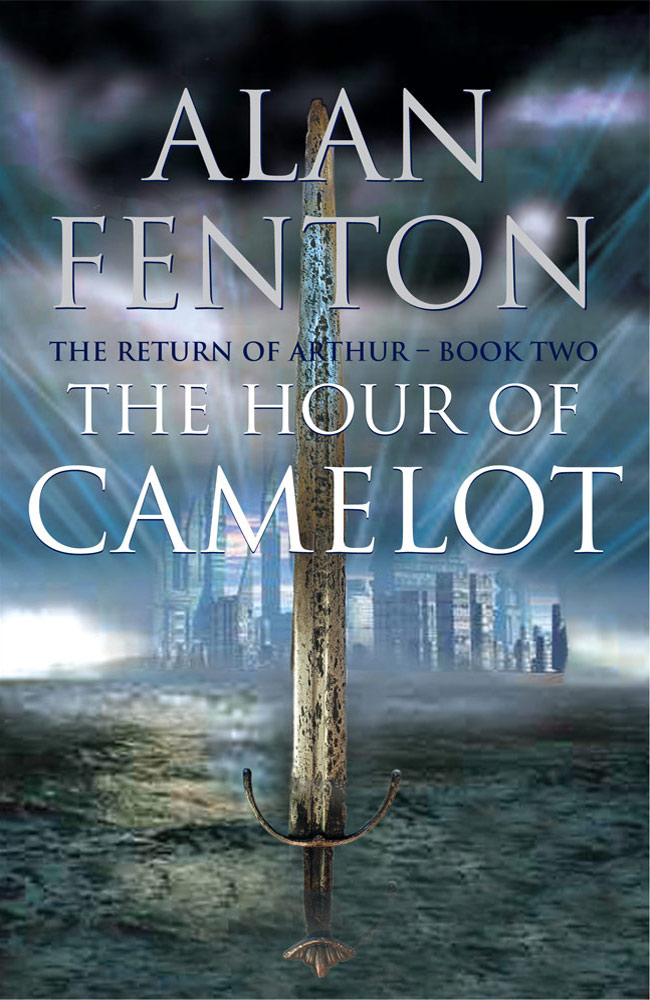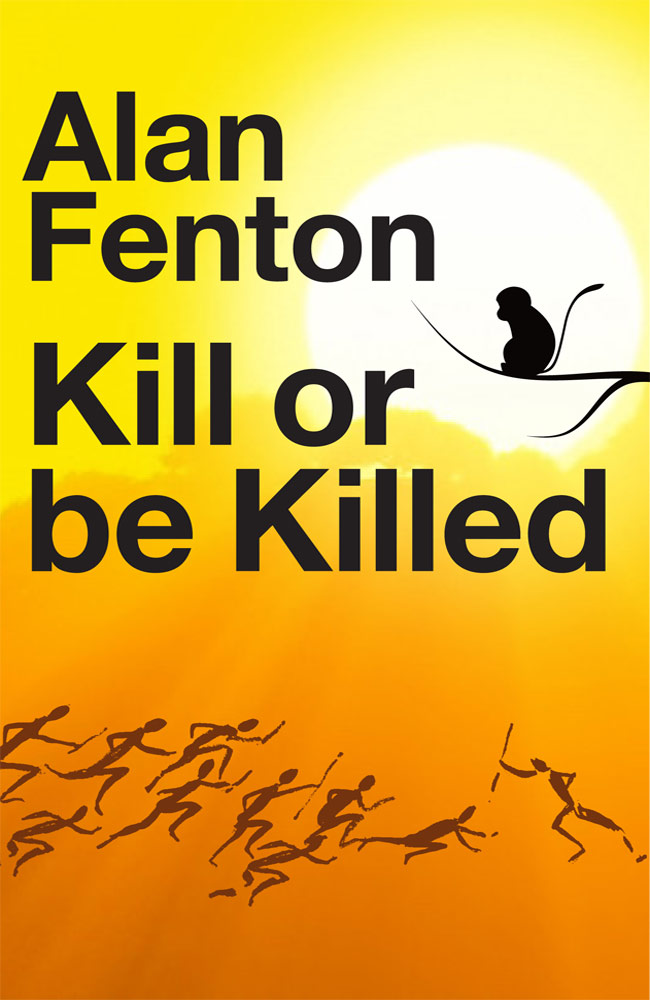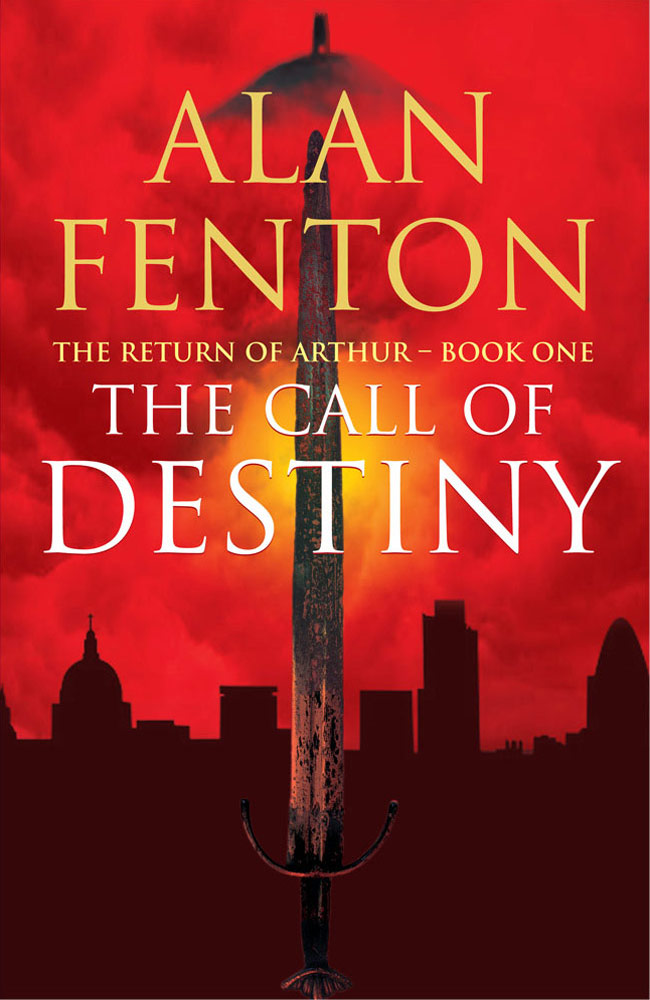THE HOUR OF CAMELOT
The second book by Author Alan Fenton
THE HOUR OF CAMELOT The second book by Author Alan Fenton, is as compulsive as the first. A wonderfully entertaining re-imagining of the legendary story of King Arthur that combines enthralling adventure and passionate romance, and in the process touches on universal themes.
Fulfilling the age-old prophecy, King Arthur has returned.
Confronted by global terrorism, world leaders are disunited and indecisive. On a remote island a new Camelot is born, from where Arthur and the 21st Century Round Table launch a series of devastating attacks on the dark forces that threaten the planet. Yet within Camelot itself, forbidden love, murder and conspiracy threaten Arthur’s quest. As the kingdom begins to crumble, will the dream of Camelot die?
PREVIEW OF THE HOUR OF CAMELOT
The second book by Author Alan Fenton
Climbing into the ring the master of ceremonies announced the main bout in the time-honoured manner. ‘And now, laydees and gentlemen,’ he intoned, ‘the event you have all been waiting for – a contest of six, three minute rounds, between these two superb athletes – Gawain and Lancelot.’
There were cheers and applause as first Gawain, then Lancelot, ducked through the ropes and danced round the ring, waving to their supporters. Then came even louder cheers and counter cheers, as, to the especial delight of the ladies, they removed their robes, Gawain exposing scarlet shorts, Lancelot royal blue. Physically they presented a great contrast: Gawain short and thickset, with prominent pectorals and biceps; Lancelot, tall and lean, his muscles less conspicuous. Both men, as everyone knew, were extremely fit, both experienced boxers, Lancelot a university boxing blue, and Gawain a former navy middleweight champion. It promised to be an entertaining fight.
As the bell rang for round one Gawain caught Lancelot with two straight left jabs, followed by a wicked right hook that knocked him off balance. Dazed and confused, his legs buckling under him, it seemed he must surely go down, yet although he took severe punishment, he was still on his feet when the bell rang for the end of the round.
In the second round the match began to swing the other way.
It was fighter against boxer, and the boxer was beginning to get the measure of his man. The second and third rounds were Lancelot’s. Gawain was fast and aggressive, and his right hook was a potential match winner; Lancelot, however, was the more skilful boxer and had the advantage of a longer reach. Time and again, as Gawain rushed in, Lancelot caught him with left jabs, then danced away, teasing his opponent into wild swings that rarely made contact. Though he never looked like knocking Gawain out, he was beginning to make him look clumsy, the crowd applauding this exhibition of boxing skill, even though most of them were secretly hoping that Gawain would win.
Lanky was in awe of Lancelot, and thought him ‘the dishiest man’. But if she was attracted to Lancelot, Gawain she found irresistible. Standing on her seat, she screamed encouragement, all the time blowing noisy kisses at him, much to the mortification of Guinevere. ‘Do sit down! The whole world will know you fancy him.’
‘What if they do?’
‘Really, Lanky, you are too much,’ said Guinevere, exasperated.
‘Who do you support, Ginny?’ asked Lanky, a glint of mischief in her eye.
‘Why should I care who wins?’ said Guinevere, her colour high, her breathing fast. Though she might feign indifference, there were some things one woman could not hide from another, especially one who knew her as well as Lanky.
The fourth round, too, was Lancelot’s, the fifth shared. That made it three rounds to Lancelot and one to Gawain, with one round even. Only one round to go. Waiting in their corners for the sixth and final round, the two men listened to their trainers.
‘Keep on jabbing and stay light on your feet,’ urged Ian Duncan. ‘You’re odds on to win.’
‘Odds on? I’m a certainty,’ boasted Lancelot.
Gawain was in poor shape, his face bruised and swollen, his right eye rapidly closing, the cheek below it badly cut.
Sponging his face tenderly, Gaheris, his younger brother, tried to stem the flow of blood. The big man adored everything about Gawain, his compact, sturdy frame, his red hair, his courage. If only the rules allowed it, he would have advanced into the ring himself, picked up Lancelot, lifted him high, whirled him round and tossed him into the crowd. The odds against Gawain winning were long, but one thing was certain, he would never give up, not till the final bell. Gaheris whispered deafeningly in Gawain’s ear, ‘Go for a knockout! One right hook and he’s down!’
Everyone in the audience knew that if Lancelot were still standing at the end of the final round, he would win not just the boxing match, but the tournament. They cheered and stamped their feet, many of them, appreciating his fightback, shouting Lancelot! Lancelot! Lancelot! It was music to his ears. True, he had never courted popularity, had in fact disdained it, but he was human. This was a new experience, and he was loving it.
Raising his arms high in a victory salute, he acknowledged the applause, so that when the bell rang for the final round he was distracted by the crowd’s adulation, rising from his chair a fraction of a second too late. Charging across the ring like an angry bull, Gawain rocked his head back with a left jab and floored him with a savage right hook to the chin. Lancelot crumpled and fell. The referee stood over him and began to count.
‘One! Two! Three!’
The crowd was stunned to silence.
‘Four! Five! Six!’
Lancelot stirred . . .
‘Seven! Eight!’
. . . pushed himself up from the canvas on one knee . . .
‘Nine!’
. . . and fell back again.
‘Ten!’
Arms wide, the referee signalled that the fight was over. The crowd erupted, cheering, stomping and waving their arms. Long after the boxers had left the hall, they were still chanting – first Gawain’s name, then Lancelot’s – with cheers and stamping of feet from the two rival camps. Though it might not have been the greatest boxing match anyone had seen, it was certainly the most exciting.
‘I won fair and square,’ said Gawain later in the changing room, ‘though I admit I had a bit of luck.’
Lancelot sniffed. ‘I made it easy for you.’ Zipping up his holdall, he added, ‘A mistake I shall not repeat.’ And with that he stalked out.
‘I confess I was wrong and you were right,’ Leo told Arthur that evening. ‘The contest has certainly brought out the best in those two young men.’
Arthur was delighted to have the blessing of his old mentor.
‘Yes, it has, Leo. They have demonstrated all the qualities needed to be my Chief of Staff – except one.’
‘What is that?’
‘Chivalry.’
‘An old concept, I would have thought.’
‘No less relevant for being old,’ said Arthur.
‘You think chivalry is still relevant in the twenty-first century?’
‘Most certainly I do.’
‘When Lancelot swam to the finishing post, he was declared the winner in accordance with the letter of the law – certainly not the spirit. Was that chivalrous?’
‘It was not,’ said Arthur.
‘And when Gawain knocked out Lancelot when his attention was distracted, was that chivalrous?’
‘No.’
‘There you are, then. Chivalry is dead. In this remorseless age of ours, Justice, Honour and Courtesy are worthy ideals, I grant you, but that’s all they are. There’s only one thing that counts.’
‘And that is?’
‘Winning.’
‘I don’t agree.’
‘It’s what Camelot has to do, isn’t it?’
‘Not at any cost,’ said Arthur. ‘We must keep faith with our ideals. If we forget what we are fighting for, we lose the moral right to fight.’
‘Are you saying it is chivalry that distinguishes us from our enemies?’
Arthur considered his answer carefully. ‘Animals are programmed to do what they do,’ he said. ‘They have no choice. We do. And one of the choices we have is to show compassion and consideration to our fellow men, even to our enemies – in other words, to be chivalrous.’
Leo was not persuaded. Being both man of action and man of conscience – a rare blend – was what made Arthur so special, and set him apart from men like Lancelot and Gawain. Yet conscience was a heavy burden to carry into battle, one that could ultimately weaken the arm that held the sword. Though he admired Arthur above all men, he pitied him too, observing in him a reluctant hero, a man of peace compelled by destiny to become a man of war.
REVIEWS OF THE HOUR OF CAMELOT The second book by Author Alan Fenton
The second novel by Alan that continues to expand on the modern retelling of the Arthurian myth and one that makes it a great way to learn of the tales in within a novel context. Here Alan’s storytelling expands into its own with his sharp storytelling mythos blends seamlessly with great dialogue and character growth. A real joy to read and of course, something that really will hopefully allow Alan to meet a larger audience.
Gareth Wilson – Falcata Times Blog
Myths that surround mid-Somerset take centre-stage in a new two-book series revisiting the Arthurian Legends.
But this time instead of Arthur being set in the times of Sir Thomas Malory’s medieval book, the author Alan Fenton has chosen to play out the tale against the backdrop of the 21st century.
The Return of Arthurs is split into two volumes: book ones if The Call of Destiny and book two is The Hour of Camelot.
The call of Destiny opens on the summit of Glastonbury Tor with a Merlin-like character mentoring a little boy called Arthur.
It begins in London in 1994 and the story starts with the conception of Arthur. The Arthurian legend then unravels through the book, but set in the world of politics, intrigue and, unlimitedly, global terrorism.
The second volume is set in the future on the island of Camelot, the base from which Arthur and his 21st century knights launch attacks on the dark forces that threaten the planet.
The books are written by a former businessman and television script writer Alan Fenton, whose first novel Shadows of the Titan was based on his business experiences, before he turned his attentions to the Arthurian legends:
“I have always been fascinated by the Arthurian legend – by the warrior hero, Arthur himself, and the characters around him – Merlin the Magician, Arthur’s wife, the beautiful and seductive Guinevere, Lancelot, the brooding and complex hero who has an affair with her, Mordred, Arthur’s son who hates his father, Gawain, Agravaine, Gaheris and Gareth, Morgause (Margot in the book who had an incestuous relationship with her half-brother Arthur resulting in the birth of Mordred) Morgana le Fay (Morgan in the book), the half crazy witch, and all the rest of them. However, so many thousands of books have been written about these characters over the last five hundred years that it never occurred to me to write yet another one, until I had the idea of re-inventing them in our 21st century world.”
This raised compelling questions. In this dangerous age, do we not need a hero such as Arthur, someone with courage, conviction and honour? And how would such a man tackle the complex problems and issues of today’s troubled times?
“Arthur is probably the most famous of all mythological heroes. If he were born again, as Thomas Malory prophesised, what sort of man would he be? Soldier? Adventurer? Statesman? Politician? And what would he do in our 21st century world? Would he have a son by his half-sister, Margot (Morgause?) And would that son, Mordred, plot to overthrow him? Would Lancelot, Arthur’s closets friend, betray him?
Would there be a Camelot? A Round Table? Would Arthur accept what Merlin says is his destiny – to try and save mankind from the forces of darkness, as once he tried to save Britain from the marauding Saxons? And if he did, would he succeed? What would happen to Merlin? To Lancelot and Guinevere? Would Galahad find the Holy Grail?
People will have to read The Call of Destiny and The Hour of Camelot to find out.”
Emma Frampton, Midsummer News
BOOKS BY ALAN FENTON
TO KILL OR BE KILLED
By Alan Fenton
“A wealthy hedge fund trader with the world at his feet, making money is more important for James Winston than anything else in life – including family and friends. His philosophy is basic and uncompromising. “Life is about survival. We eat to stay alive. If a man is hungry, he’ll do what he has to do. Whatever it takes.”
THE HOUR OF CAMELOT
By Alan Fenton
Fulfilling the age-old prophecy, King Arthur has returned.
Confronted by global terrorism, world leaders are disunited and indecisive. On a remote island a new Camelot is born, from where Arthur and the 21st Century Round Table launch a series of devastating attacks on the dark forces that threaten the planet. Yet within Camelot itself, forbidden love, murder and conspiracy threaten Arthur’s quest. As the kingdom begins to crumble, will the dream of Camelot die?
THE CALL OF DESTINY
By Alan Fenton
It is said that in times of trouble King Arthur will return.
In the new millennium the world is sliding into chaos, its stability threatened by evil men engaged in the ruthless pursuit of global domination.A brilliant scientist, Merlin, takes under his wing the newborn Arthur, illegitimate son of a leading British politician. Guided by Merlin, the boy grows to manhood, becoming a renowned soldier and natural leader. But will he have the courage to fulfil his destiny?
101 VERSES
By Alan Fenton
"These verses are about a variety of things that either amuse me or trouble me about life - as, no doubt, they do many people. Some are about things I love, like dogs, some about things I hate, like the hunting of wild animals, some are about belief and disbelief, some about faith, or lack of it, some about love of life and fear of death, some about my views (no doubt shared by many!) on politicians, and Scientific Advisers! I had great fun writing them. I hope you will enjoy reading them."





